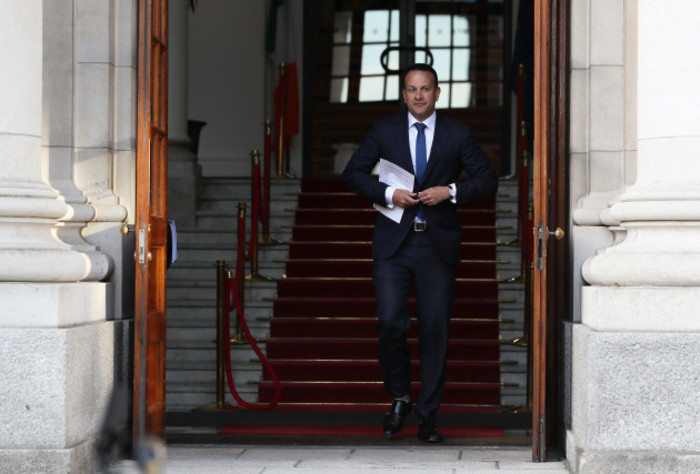How employers can influence government officials in the 'new politics' age
The proposed Brexit Bill highlights why public affairs strategies are more important than ever.
ACCESS TO OUR politicians and ministers is an advantageous and unique element of our national political system. Or at least it used to be.
If you’re based around Kildare Street or Merrion Square, you might bump into An Taoiseach or ministers Simon Harris or Regina Doherty getting their lunch.
Outside of Dublin, you could find yourself sitting beside Tánaiste Simon Coveney in Páirc Uí Chaoimh or skipping in front of Minister Heather Humphreys in the SuperValu in Monaghan town to get your EuroMillions ticket before the deadline.
A public affairs strategy works in the same way: it allows you to ‘skip in front’ of our government with industry insights, domestic reality, European intelligence and global predication that our national politicians often overlook, ignore or don’t have time to research and compute.
This government, in its minority capacity, is solutions-focused like no other. Whingeing does not resonate with today’s political decision-makers.
Most modern politicians work through the lens of realism and progression, and they constantly need to be presented with carefully considered and fresh approaches to tackle social domestic issues, European conundrums and wider international concerns.
Because of this, it is becoming increasingly difficult to engage with politicians without the correct approach. A meeting isn’t a successful outcome for a client, and many requests for sit-down sessions with ministers and TDs find their way into the shredder. Lobbyists must now become partners.
 Taoiseach Leo Varadkar
Taoiseach Leo Varadkar
The new priority for every business leader should be building an interchangeable platform between internal staff and public affairs experts that allows the company to constructively engage with TDs and senators, and more importantly, An Taoiseach’s office and his cabinet.
It is almost as important to build a rapport with their advisers and the correct government or department officials.
Connections and contacts used to get you a personal email address, a mobile number, or a pint of stout in a snug bar, but even that is a struggle now.
To have any effect on the ‘new politics’, much more must be done.
What a modern, expertly devised public affairs component can add to a consumer or corporate communications strategy should not be underestimated – or feared.
Brexit Bill
Public affairs can bring a key message from a Google search to government buildings or from the Leinster Leader to Leinster House, potentially leading to a vital positive change for your business or sector.
This is more important than ever taking into consideration the publication of the government’s Brexit Bill, which is an effort to protect our country from the impact Brexit is already having and the anticipated harm that may follow.
However, it has already been over two and a half years since the Brexit referendum.
Since then, among many changes, we have had one government; two Taoisigh; two Tánaistí; two minsters in the portfolios of finance, communications, education, business, foreign affairs, justice and social protection; and three chief whips who have all been unable to provide answers that reassure business owners and leaders about life after to Brexit.
The vote in the House of Commons on 15 January and the developments since have only increased the unanswerable and growing list of questions.

But now the government has some legislative matters to look after. It is faced with the prospect of trying to pass the Brexit Bill – and all of its 17 parts spanning across at least nine departments – through both houses of the Oireachtas.
As confirmed by Minister Seán Kyne, the government chief whip, this will be the only priority legislation published in this term – everything else in on the back burner.
Brexit has given many business owners and organisational heads cause for concern, and they have every right and reason to approach an elected representative, particularly a government minister, to discuss potential workarounds, fixes and back-up plans.
Practical solutions
Unfortunately, public affairs advisers often hear from clients, “Why would that minister care about us?”
That minister cares about you because you have something they don’t: industry intelligence and a national solution.
Not only do they need your intricate taxation proposal, but they also need to see how it could have a positive effect on Ireland.
They don’t have your one-page analysis of an environmental issue in the west of the country, but they need it – and your expert advice and plan to resolve it.
Likewise, they don’t know that you’re a bespoke candle-maker along with hundreds of others in the country, but they do know that if a hard Brexit materialise,s you’re out of a job.
Rather than hear you complain, they want practical solutions to resolve your particular issue for the betterment of the entire country, in words, messaging and formats they can understand, listen to and act upon.
The knowledge of how to create a defined, focused strategy that resonates with Oireachtas members and officials can come from various resources.
Many political correspondents have made the move to the public affairs arena. Many former political staff are also is this space.
They possess the knowledge of how the system operates, what works and what doesn’t, and how to influence the decision-makers. They are there to be utilised.
Positive engagement with elected representatives and their advisers can result in increased reputation, the formation of influential relationships, and recognition that your work has done the nation a service that would otherwise never have been achieved by the government alone.
Speaking at the annual awards dinner of the Congressional Black Caucus in 2011, former US president Barack Obama said, “The future rewards those who press on. I don’t have time to feel sorry for myself. I don’t have time to complain. I’m going to press on.”
Take note.
Danny Hanley is a client manager at PR360.






